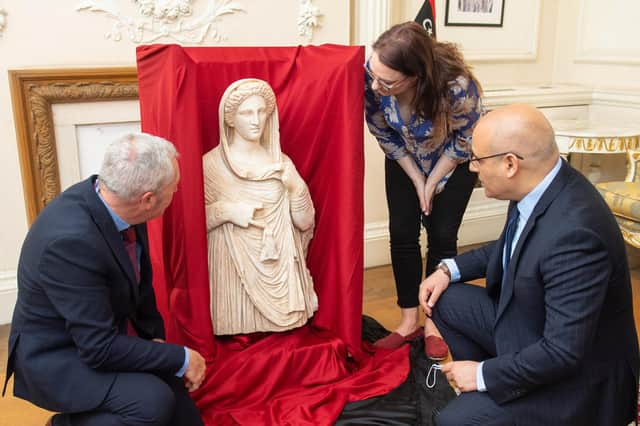'Global Britain' can lead the world on cultural decolonisation by returning historic artefacts acquired in questionable circumstances or just plain looted – Matthew Taylor


Following a tortuous battle with international bureaucracy, the announcement was made that the sculpture would return to its homeland.
The British Museum’s acting keeper of Greek Collections noted that “it is just lovely to be part of a story which has a happy ending”, adding that in its mother country it will “stand in one of its museums as a star piece”.
Advertisement
Hide AdAdvertisement
Hide AdBefore Greeks get too excited though about the success of their long-standing request for the Parthenon Marbles, I must point out that we are discussing a Cyrenaican funerary statue illegally trafficked from Libya, then seized by UK border officials in 2013. The British Museum’s involvement was limited to identifying it, then housing it until the return process was finalised.
Sadly, the approach outlined above is rarely applied to other items in the British Museum’s permanent collection – some of them equally (if not more) deserving of return. It seems that wanting to “be part of a story which has a happy ending” is something that only happens occasionally.
In the realm of the UK’s national museums, recent problems are invariably far more easily solved than longer-standing ones. Britain regularly helps to return looted artefacts smuggled into the country in the last 20 or so years, while steadfastly avoiding any meaningful engagement in discussions on those that arrived here earlier, despite repeated requests.
Can this approach be continued indefinitely? Unlikely. Times are changing, attitudes are changing and, internationally, many museums are changing too.
Last month saw the return of two sandstone temple lintels to Thailand by the Asian Art Museum of San Francisco. This return followed on from the museum’s research into the lack of proper export documentation and a request by the Thai government.
In April, Berlin's Ethnologisches Museum announced plans to return many bronze sculptures (originally taken by the British in the Benin Punitive Expedition of 1897) to Nigeria next year. A month earlier, the University of Aberdeen announced repatriation plans for another Benin Bronze, describing its 1957 acquisition at auction as "extremely immoral”.
Throughout Europe and the USA, artefacts with acquisition stories perhaps best described as problematic, are now being returned. Sometimes this is in response to direct requests and within existing legal frameworks, but in many more cases, it is being done because it the right thing to do.
The fact that there might be no legal obligation to do something does not alter the fact that there can be an overwhelming moral obligation. This moral obligation is what is driving these restitutions, while the legal frameworks slowly play catch-up.
Advertisement
Hide AdAdvertisement
Hide AdWe should not be afraid of this though – instead, we should see it as an opportunity for us to lead the world, to help redefine museums for the 21st century and be at the forefront of cultural decolonisation. Our reputation around the world would be boosted. There’s an immense well of soft power there, waiting to be tapped.
It’s time for us to lead the world again and create a positive international image for ourselves. This is what global Britain ought to mean.
A message from the Editor:
Thank you for reading this article. We're more reliant on your support than ever as the shift in consumer habits brought about by coronavirus impacts our advertisers.
If you haven't already, please consider supporting our trusted, fact-checked journalism by taking out a digital subscription.
Comments
Want to join the conversation? Please or to comment on this article.
